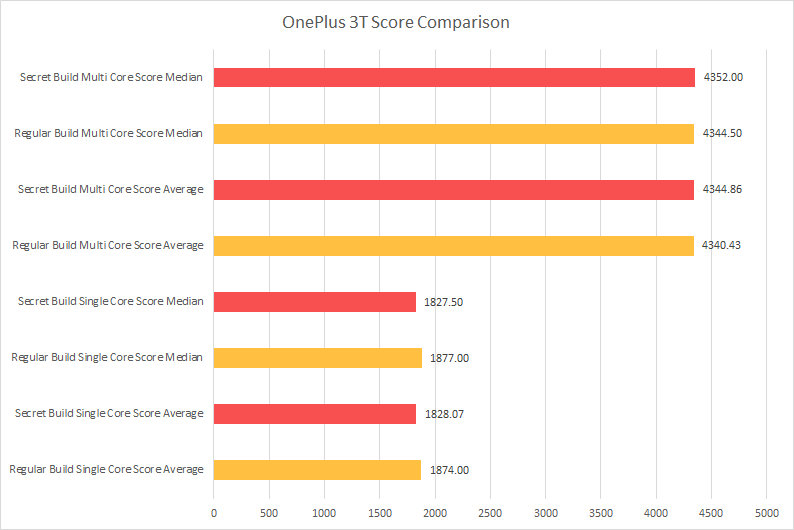
- #Oneplus benchmarks geekbench cheating full#
- #Oneplus benchmarks geekbench cheating android#
- #Oneplus benchmarks geekbench cheating pro#
- #Oneplus benchmarks geekbench cheating series#
The action follows the discovery that a preloaded app on.
#Oneplus benchmarks geekbench cheating series#
Surprisingly, Meizu has four low-performance cores, four medium performance cores and two high-performance cores. Popular benchmark app Geekbench confirmed it banned the Galaxy S22 series and other Samsung phones found to be cheating in benchmark apps. According to Mario Serrafero, Editor-in-Chief of XDA Developers, some apps were ‘not falling back down to their normal idling speeds after opening.’ Meizu, in turn, got the ‘phone to switch to using the big cores when certain apps are running’ with an aim to improve the benchmark performance, according to XDA. So, what did they find? XDA, while testing found that OnePlus 3T’s core remained at higher speeds even when there was no CPU load and that too when they detected a benchmark app. The cheating on benchmark tests by smartphone manufacturers is not a new phenomenon as even Samsung has been reported to have been modifying the applications, in order to get higher scores. Meanwhile, OnePlus has admitted its mistake and has promised to not do it in future.
#Oneplus benchmarks geekbench cheating pro#
It is even limiting the performance of popular social media applications and web browsers such as Instagram, Snapchat, and Microsoft Edge.According to an XDA developers group, Chinese companies Meizu and OnePlus have bene found to be tinkering with their benchmark performance and particularly targeting SoCs and phones to achieve higher scores. Performance benchmarking platform Geekbench has delisted the OnePlus 9 Pro and OnePlus 9 smartphones after a report by AnandTech revealed that the OnePlus 9. According to the publication, the OnePlus 9 Pro is limiting the performance of the Snapdragon 888 SoC in all the applications from Google and Microsoft.
#Oneplus benchmarks geekbench cheating full#
AnandTech has found that the OnePlus 9 Pro isn’t making full use of the SoC in other applications including all the popular apps that you see on the Google Play Store and the ones that many people use on a daily basis. Upon deeper inspection, it turned out that the OnePlus 9 Pro is using the Cortex-X1 core and/ or the full potential of the Snapdragon 888 in only popular benchmarking apps. As a result, every OnePlus 5 review citing benchmark scores as an accolade of the phones success is misleading both writers and readers, and performance analyses based on synthetic benchmarks are. OnePlus 9 Pro limiting chipset performance in all popular apps Although the difference isn’t much, it is probably enough for some unsuspecting reviewers to declare the OnePlus 5 as the performance king among. However, the phone used the full potential of the SoC in all other benchmarking apps including AnandTech’s own applications. The multi-core scores in Geekbench 4, for instance, came in at over 6700 when the hidden build of Geekbench (to check what the phone should realistically score) didn’t post a score above 6500. According to the publication, the OnePlus 9 Pro uses the Cortex-X1 core in Vivaldi only during the first test on a fresh install. Surprisingly, even these cores ran at 2.0GHz instead of their maximum frequency of 2.41GHz. Instead, the phone used the Cortex-A78 cores.



#Oneplus benchmarks geekbench cheating android#
Android Authority reports: Yesterday, AnandTech posted some information about 'weird behavior' it spotted with the OnePlus 9 Pro.

However, when they ran the test again, the phone did not use the Cortex-X1 core. OnePlus 9 Series has been caught in manipulating benchmarks and now they have been delisted from the official Geekbench listings. Popular benchmark site Geekbench has removed OnePlus 9 benchmarks from its charts due to allegations that the company designed Oxygen OS optimization tools in such a way that they could be viewed as cheating. In this test, the OnePlus 9 Pro used the Cortex-X1 core and delivered a score of 107 points, which is in line with the other Snapdragon 888 powered smartphones. The removal is due to allegations that OnePlus designed Oxygen OS optimization tools in such a. To analyse the weird behaviour, AnandTech ran a popular benchmarking app called Vivaldi on the device. JTL DR Popular benchmark site Geekbench has removed OnePlus 9 benchmarks from its charts.


 0 kommentar(er)
0 kommentar(er)
